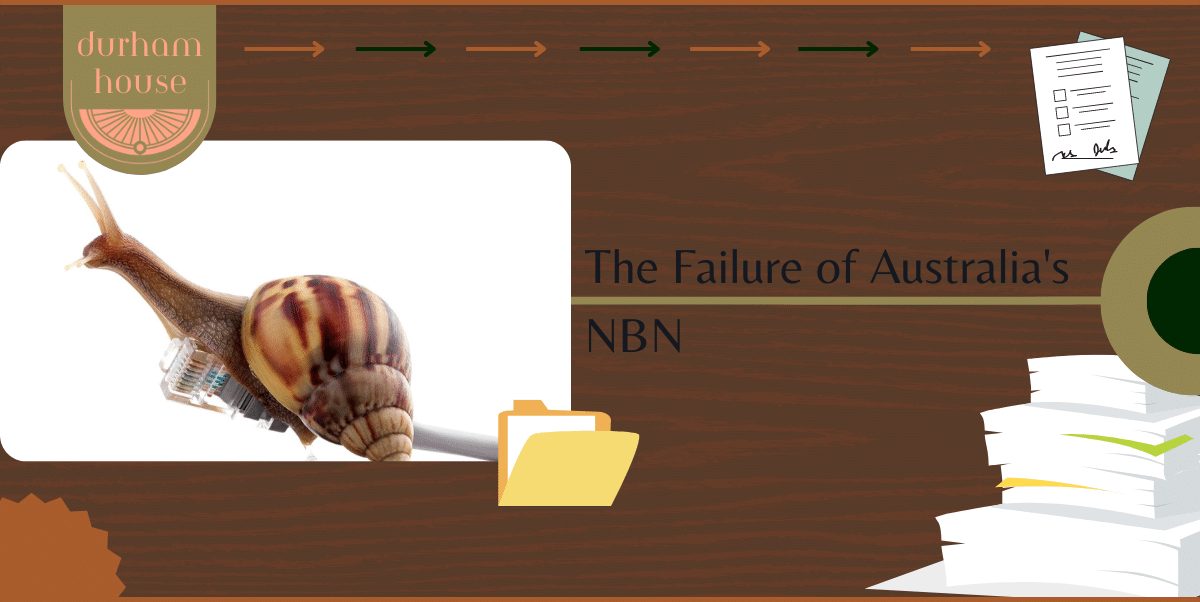Australia’s National Broadband Network (NBN) was supposed to be a transformative endeavor for Australia. The government spruiked it as a beacon of progress that would usher in an era of high-speed internet access for all of Australia. That was back in 2009 when the Kevin Rudd government introduced NBN Co, a hastily lashed together startup with an ambitious mission of replacing outdated copper wiring with modern fiber-to-the-premises (FTTP) broadband. The promise was attractive to many Australians–delivering equitable and fast internet access to every part of the nation, elevating Australia to the forefront of global competition in education, business, and inovations.
The broken promise of NBN
As the ambitious NBN journey unfolded, it quickly became apparent the promise was an illusion, always just that little bit further out of reach due to cost blowouts, political infighting, uncertainty, and technical brick walls. Although touted as a game-changer, NBN quickly degenerated into a disastrous story of failure and false promises. Instead of the acronym “NBN” conjuring visions of progress and connectivity, it has become an emblem of inefficiency, mismanagement, and missed opportunities.
The glaring failure of the NBN is its inability to deliver on its core mandate–to provide fast and reliable internet speeds to Australian citizens. Rather than enjoying the promised world-class internet speed, Australians have found themselves stuck with one of the slowest internet speeds in the developed world, with the country embarrassingly ranked among the slowest. At the time of writing, the vaunted gigabit internet remains inaccessible for many households.
Why is Australia’s internet still so bad?
We cannot blame the failure of the NBN on technical limitations alone. It is a tapestry of politics, poor decision-making, and a lack of long-term vision from the government. In 2013, the Liberal government took power and rejected the Labor government’s original FTTP plan. Instead, the ill-conceived Multi-Technology Mix (MTM) network was presented as a cost-effective alternative. However, this MTM network has proven to be falsely economical, plagued by congestion issues, the impossibility of achieving the speeds customers paid for, and an inability to deliver on its promise of an acceptable internet experience.
The projected costs of the MTM network ballooned from an initial relatively modest estimate of $29.9 billion to $51 billion. Rather than being a beacon of progress, the NBN has become an iconic example of financial mismanagement, with taxpayer money poured into a void of inefficiency and misjudgment. The cost blowouts have not only led to financial strain but have also cast a shadow over the legitimacy of the entire NBN project in the mind of the public. It is a reminder of how grand visions can fall apart in the face of political saber-rattling, lack of foresight, and shortsighted decision-making.
Can the NBN be fixed now?
The 2022 election campaign once again reignited hopes for a proper NBN in line with the Labour government’s original vision. But it’s reasonable to question if these promises are as hollow as the previous promises when the vagaries of politics and the internal workings of NBN Co have proven their ability to undermine every attempt to salvage the massive failure that has defined the NBN rollout thus far. The proposed $2.4 billion investment to fix it pales in comparison to the amount that has so far been thrown at NBN with very unsatisfactory results.
While the government’s election promises have focussed on upbeat messages about economic growth and enhanced connectivity, the reality can seem bleak for many Australians. Even if the government hits its infrastructure targets, NBN Co’s monopolistic hold on residential services has led to some of the highest prices in the world, leaving some already marginalised citizens priced out of accessing proper internet, which is an essential service in the modern world. Reports of financial troubles at NBN Co raise the specter of further mismanagement and existing inequalities in the quality of internet access getting even worse.
The missed opportunities have made NBN a national disappointment and the way it was built was always doomed to be obsolete before it was complete. This half-baked product is sold at a price much higher than what it should be. It is widely accepted that we have an underperforming network that doesn’t meet the needs of many Australians. Potentially our salvation lies in private networks rather than waiting for the government to fix the broken and clunky NBN, but even if we can achieve acceptable internet speeds by seeking alternatives such as 5G wireless broadband.
NBN has tarnished Australia’s image

The amount of public money that has been thrown at a substandard embarrassment of a network will have a broader impact on the public’s trust in the government. We can only hope that the Albanese government can mitigate the problems with the NBN enough for the average Australian to have any confidence in any promises the government makes in the future, especially about technical projects. The government and NBN Co shouldn’t fall victim to the sunk costs fallacy of thinking the amount of money already spent on NBN means we have to throw even more at an ineffective strategy. We need an honest appraisal of what it will take to fix Australia’s internet. It has become more than a technical problem, but an issue that affects our image of ourselves as a nation. It also affects the world’s confidence in Australia, when something as simple as talking to a friend or relative overseas via video chat can be a consistent problem and cause people around the world to have an impression of Australia as a country that is behind the rest of the world technologically. It is bad for international relations if people who don’t know much about Australia might only think of slow internet and outdated technology due to their personal experience trying to communicate with people in Australia. Also reliable internet is so important to people’s livelihoods it might make their decision whether to live in Australia or elsewhere, especially if they work in the technology industry. We face a real danger of being left behind the world in many ways if we can’t recover from the failure of our NBN.









